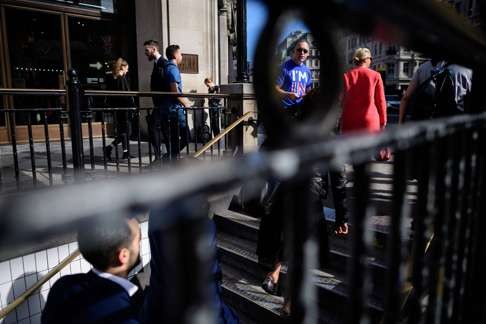
After the Brexit vote, just who will clean up the mess?
Kevin Rafferty says whether Britons vote to stay in or leave the EU, the scaremongering campaigns on both sides have created such a toxic environment that damage control won’t come cheap
Most countries, including China and North Korea, profess that democracy is the best form of government. And what can be more democratic than a referendum, allowing consultation of all the people on the really important matters of state?
Unfortunately, the people of Britain are going to wake up on Friday to realise that their great referendum on whether to stay a member of the European Union or to leave has settled one issue, only to create a larger problem.
Latest opinion polls suggest the result is too close to call. The tragic murder last week of Member of Parliament Jo Cox, a supporter of Britain’s membership of the EU, seems to have stopped the momentum that the Leave campaign – or Brexit – was gathering. Whichever side wins, it will be a modern Pyrrhic victory, with expensive political and economic prices to pay.
Whichever side wins, it will be a modern Pyrrhic victory, with expensive political and economic prices to pay
Democracy does not always produce good or even just outcomes. Britain’s referendum campaign has degenerated into a farrago of scaremongering, myths, half-truths and outright lies, in which both sides have excelled, creating a poisonous atmosphere.
The Leave gang have been touring on a bus proclaiming that the UK pays £350 million (HK$4 billion) a week to the EU. The Guardian estimated that the weekly cost was £136 million, after taking into account the British rebate and EU funding for UK projects. “It’s like saying that a pint of beer costs £20 because you pay with a £20 note and don’t count the change,” the paper commented. The Remain camp claims that three million jobs are at risk if the country leaves. George Osborne, the chancellor of the exchequer, claimed there would be a £30 billion “black hole” if Britain voted to leave, which he would have to fill with higher taxes and spending cuts. These assertions prove that the economics of membership runs into the dark forest of lies, damned lies and statistics.
Yellen cautions over exaggerating global impact of Brexit

Who’s at risk in Brexit? UK-exposed banks and utilities among Hong Kong stocks most vulnerable, analysts say
Nevertheless, almost every respected international organisation, including the International Monetary Fund, the OECD and Bank of England, as well as 90 per cent of more than 600 distinguished economists polled, concluded that the UK’s growth will fall, jobs will be lost and the country will face chill economic winds outside Europe. Foreign companies with big investments in the UK will consider whether to move to the mainstream EU.
The markets, represented by the stock exchange and sterling, are already twitching. The pound has fallen, and forex traders predict it could lose another 15-20 per cent if the UK leaves. This is serious when the UK current account deficit is 7 per cent of gross domestic product, and the country relies heavily on flows of foreign funds. No one wants to hear about grim economic prospects because the Leave campaign has turned this referendum into a debate about politics and the twin myths: British sovereignty and immigration. “Take back control of our country” is their message.

Once Britain is free of the EU’s shackles, there’s nothing it cannot achieve
In this age of globalisation, sovereignty has been pooled and surrendered, and only a continental country, like China, the US, or perhaps Russia, can pretend to stand alone against the world, and even they are learning that they cannot ride roughshod over everyone.
Conservative Eurosceptics would like to turn back the clock, to a white Commonwealth plus the US that would offer an Anglo-Saxon alternative to the EU. Dream on: US President Barack Obama has made it clear that the US prefers Britain in the EU; leaders of Australia, New Zealand and Canada are grown-ups and don’t want a faraway nanny in London.
Control over immigration is a more tempting dream. But waves of immigrants have enriched British life, economy and cuisine. Controlling the numbers is one thing, but spewing hatred towards all foreigners is dangerous.
The morning after the referendum, the real challenges will begin. Whatever the people say, it will be difficult to govern when a majority in the House of Commons supports EU membership, but a vociferous 44 per cent minority of the ruling Conservatives want out.

If Britain does leave the EU, it will be a mess of David Cameron’s own making
If David Cameron squeaks victory, he will be a wounded prime minister, whose immediate problem will include what to do about the rebels in his own camp. Would they accept defeat and fully commit themselves to Cameron in Europe or would they see Bremain as a temporary verdict? Backbench Eurosceptics are likely to harry Cameron or whoever takes over and make it difficult for the UK to play a constructive leadership role in Europe – which both the UK and EU need.
If the decision is Brexit, that will be potentially messier. It is hard to see how Cameron could remain with any honour. This would trigger a fight for the leadership, just when markets globally will be in turmoil. Article 50 of the Lisbon Treaty allows for a two-year period to negotiate the departure of the leaving country, but EU leaders warn that hammering out new trade relations could take five to 10 years, prolonging uncertainty.
Britain, don’t turn your back on the EU and its ideals as a force for good
There are too many known unknowns: who will be the UK’s leader; how markets will react after the initial shock; whether foreign investors withdraw their money or abandon the UK; above all, the mess of a contested divorce after 43 years of marriage.
Beyond are the unknown unknowns, especially how the known unknowns will interact with one another: whether Brexit may trigger a break-up of the UK, or encourage other countries to leave the EU, and how the EU will cope with a more dominant Germany.
Brexit leaders fondly assume Britain could happily sit outside the EU, as a member of the European economic family without being tied politically and with full control of its borders restored. They should take off their rose-tinted glasses.
Germany’s finance minister Wolfgang Schaeuble has pleaded with the UK not to leave the EU, but said that London should not expect special favours if it does leave and then wants the privileges of the economic club without the membership dues. Who would be trusted by both sides to negotiate a new relationship ? The best scenario is that Boris Johnson, having toppled Cameron in the game of thrones, will show that he is really a decent cove and can be a friend of the EU. That would be a dangerous triumph of opportunism. UK voters should be careful what they wish for.
Kevin Rafferty, a UK and Irish citizen, was brought up in Yorkshire

